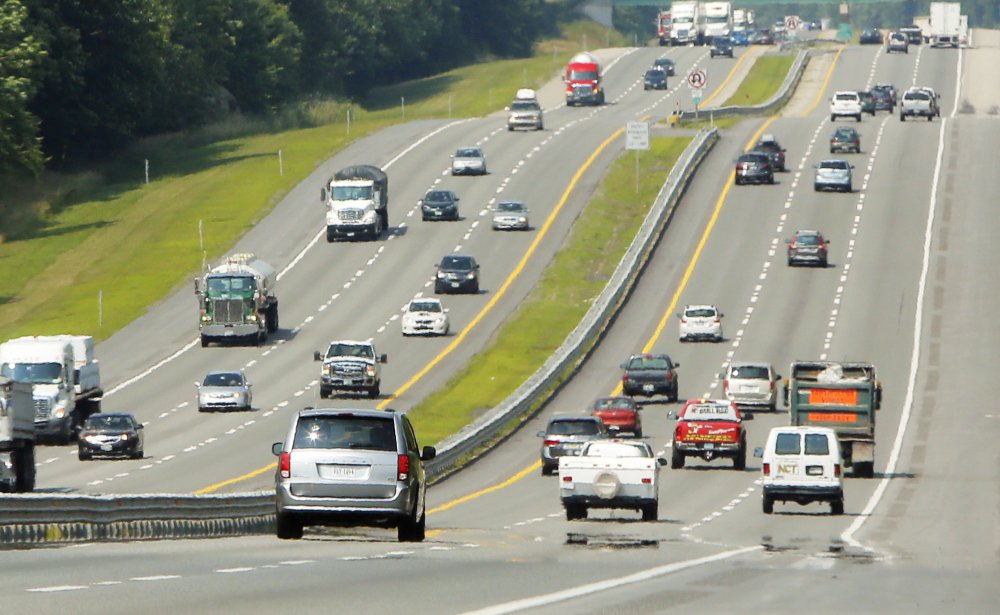AUGUSTA — A legislative committee Thursday rejected LePage administration proposals to merge the Maine Turnpike Authority with the Department of Transportation and move toward a single highway toll in York.
The unanimous vote came moments after an hourlong public hearing during which opponents urged the Transportation Committee to preserve the quasi-independence of an agency that manages what some described as “the gateway to Maine.”
“Commuters and shippers alike pay a premium to keep this critical artery in good shape,” said Maria Fuentes with the Maine Better Transportation Association, an organization that advocates for better transportation funding. “Stripping (the turnpike) of most of its funding source would be devastating to the state’s economy and would force it to compete with other roads for what is already inadequate funding.”
Under Gov. Paul LePage’s bill, the Maine Turnpike Authority would have until late 2027 to pay off its debts and to submit a plan to the Legislature to transfer all authority for the 109-mile highway to the Maine Department of Transportation. The bill, L.D. 1617, would also have required the Maine Turnpike Authority or DOT to close all toll facilities along the highway except one in York. The turnpike authority is already planning a new toll plaza in York to replace the existing one.
LePage senior policy adviser Lance Libby told lawmakers the bill was “an attempt to streamline the management of the state’s transportation infrastructure.” Libby testified that the $60 million in toll revenue currently collected in York is more than sufficient to cover the estimated $46 million in additional costs for the DOT to assume responsibility for the turnpike, which runs from the Maine/New Hampshire border to the Augusta area.
“The governor also believes that Maine citizens and businesses living along the turnpike are at a disadvantage by having to pay tolls to commute to work or to get their products to market,” Libby said. “Major transportation corridors like the turnpike should be part of the DOT and operated as one statewide transportation system. This would ease the toll burden on Mainers while still ensuring safe and well-maintained roads.”
But Diane Johanson with the Maine Tourism Association predicted that a merger – and the collection of a single, larger toll in York – could send the wrong message to tourists and harm an industry responsible for one in six jobs in the state.
“Visitors proceed past various signs that welcome them to our state: ‘Maine: The Way Life Should Be,’ ‘Maine: Worth a visit, worth a lifetime’ and ‘Maine: Open for business,’” Johanson said. “Now, imagine 10 years from now passing those welcoming signs only to reach the town of York only and be asked to hand over $10 in tolls before you can continue on down the road to your final destination.”
Created in 1941 by the Legislature and billed as New England’s first “superhighway,” the Maine Turnpike is entirely self-funded through toll revenues and bonds issued to pay for infrastructure projects. The turnpike carried a record 66.2 million vehicles in 2015 and collected $128.2 million in revenue from tolls, according to authority statistics. Two-thirds of toll revenue on the turnpike comes from out-of-state sources.
Turnpike Authority Executive Director Peter Mills officially testified neither for nor against the bill on Thursday. But Mills, a former lawmaker widely respected in the State House, warned that the bill “does not make sense” from transportation, financial, legal and policy perspectives.
Mills said requiring the authority to pay off debts within a decade would require an immediate, systemwide toll increase of 28 percent. And Mills said that Maine DOT cannot afford to manage the turnpike, as evidenced by chronic funding shortages that have forced the department to “abandon any systematic plan to reconstruct the existing roads for which they are responsible.”
In other examples, Mills shared with lawmakers a picture of a badly corroded, 100-foot-tall light pole along a stretch of highway that the turnpike authority recently purchased from the DOT. The pole was so badly corroded, Mills said, that a strong wind might have one day blown it onto the six lanes of traffic. And Mills said turnpike plow truck drivers earn a starting wage of $18.50 an hour compared to $13 an hour at the DOT.
“I’m not here to cast any aspersions on the department,” Mills said. “But they are operating under highly constrained circumstances.”
The turnpike authority also uses 5 percent of its revenues – roughly $5 million to $6 million annually – to pay for DOT projects under a compromise reached to end the Legislature’s habit of dipping into turnpike funds. And while the two agencies routinely work together on issues, Mills said, he wouldn’t anticipate a merger to yield many efficiencies.
“I’m hard pressed to say there is duplication between the two,” Mills said. “Over the years, they have worked out the efficiencies.”
Faced with a Friday deadline to complete work on bills, committee members opted to move straight into a work session after the public hearing on the bill. They then immediately voted “ought not to pass” on the bill, which is likely to be quickly dispatched by the House and Senate.
Kevin Miller can be contacted at 791-6312 or at:
Twitter: KevinMillerPPH
Send questions/comments to the editors.



